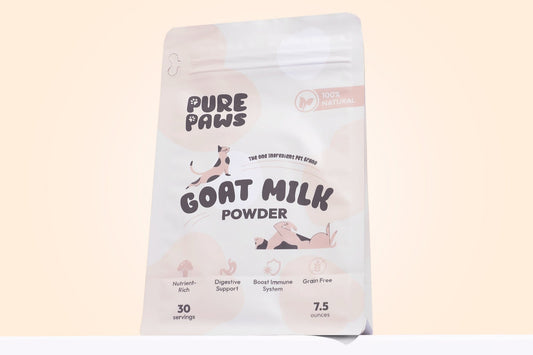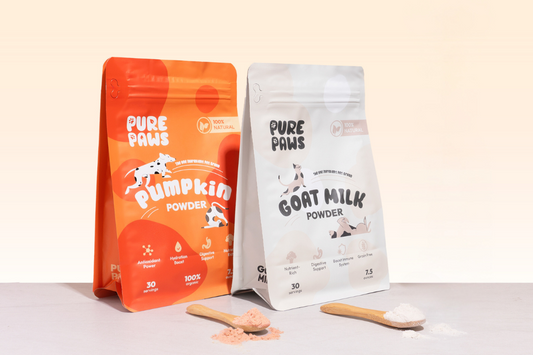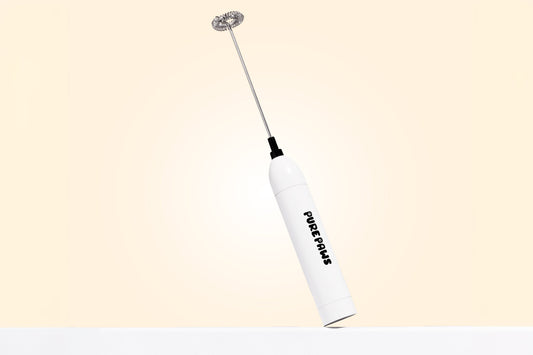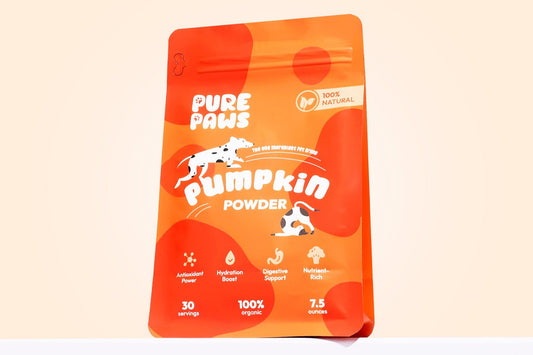
Goat Milk: Benefits and Serving Ideas for a Healthy Happy Pet
We all want to ensure the health and safety of everyone in our family, even those who walk on four paws. Everyone, not just humans, deserves a balanced and nutritious diet.
One of the best ways to deliver a balanced diet to your pets is to add a health-boosting supplement, such as goat's milk, to their meals.
Cows milk is one of the most popular beverages, with millions of gallons consumed daily, but it doesn't have the same nutrient density as goat's milk. Milk from a goat offers an abundance of fats, vitamins, minerals, and proteins. Plus, goat's milk is 1% lower in lactose.
Given dogs have a low lactose tolerance, cow milk isn't advisable. However, with goat's milk being lower in lactose, it's safe, causes fewer problems, and offers many health benefits. This means dogs can enjoy a goat milk supplement without health consequences.
Benefits of Goat Milk for Dogs and Cats
Not only do pets love goat milk, but supplementing their diet with this delicious supplement will benefit their health in several ways.
Promotes a Healthy Gut Biome
Goat milk is rich in proteins called lactase enzymes. These make it easier to digest the sugars in the milk. Other probiotic compounds, such as A2-beta-casein, promote a healthy gut microbiome that assists with nutrient absorption, filters toxins, and boosts the immune system.
Boosted Immune System
A cup of goat milk contains 140 micrograms of vitamin A and 3.2 milligrams of vitamin C, while cow's milk contains none.
While the volume is only a small percentage of what your dog requires daily, they can fill in the gaps in other areas of your dog's diet. This makes them great for maintenance, as giving your dog too much of either vitamin can be equally harmful.
Relief From Food Intolerances and Allergies
Goat milk can help dogs with food allergies or sensitivities because it's less likely to cause a problem than cow milk. The A2 beta-casein in goat milk differs from cow milk, so it is less likely to trigger an immune response like skin irritation or an upset tummy. The lactase enzyme breaks down lactose, reducing the chance of diarrhea.
Glossy Coats
Dogs with healthy, shiny coats and skin are usually the happiest pets. Goat milk contains essential fatty acids that hydrate and maintain skin flexibility while guarding against dryness or itch. Plus, it contains biotin, a B vitamin that nurtures healthy skin and promotes a lustrous coat. The earlier-mentioned vitamin E is vital for shielding against skin inflammation and damage by free radicals.
Healthy Teeth and Bones
Did you know goat milk has more calcium than regular cow's milk? This means it's fantastic for promoting strong bones, maintaining robust teeth, and preventing tooth decay. Regularly serving your pet goat milk also supplies them with phosphorous. This substance merges with calcium to make hydroxyapatite, a mineral that promotes powerful bones and teeth.
How to Supplement Your Dog's Diet with Goat Milk
The following guidelines are safe for introducing goat milk to an average adult-sized dog (around 50-80 pounds).
When adding any supplement to a pet food, the most important thing is to introduce it gradually. Start with small amounts and monitor your pet closely to watch for any adverse effects.
Start by adding about a quarter of a cup of goat's milk to their daily meal for one week.
If there are no adverse effects after this time, increase the amount gradually until you reach a full cup or approximately 9 ounces. Smaller dogs will require less, and larger dogs may require more.
If you are concerned about calorie intake, try using the milk as a meal replacement. For example, replace 1 cup of your dog's regular meal with an equivalent volume of goat milk to keep the calories around the same.
Remember that excessive dairy could upset your dog's stomach and produce symptoms like vomiting and diarrhea. Ensure your dog has plenty of water available.
Keep your eye on your dog's fur quality, weight, and overall behavior to ensure they are not reacting adversely to the goat's milk.
For other breeds of dogs, consider the following chart to work out your serving size of goat's milk.
|
Dog’s Weight (lbs) |
Recommended Serving Size (cups/day) |
|
Less than 20 |
Up to 0.25 cup |
|
20-40 |
Up to 0.5 cup |
|
50-80 |
Up to 1 cup |
|
80+ |
Up to 1.25 cups |
Goat Milk Supplement: Precautions and Considerations
Changing a pet's diet is an important step to improving their overall health. However, it's not without risks. Goat milk is not good for dogs with:
- Lactose intolerance
- Dogs with pancreatitis
- Dogs with sensitivity to dairy products
- Obese dogs or dogs prone to putting on weight
- Pets with digestive issues
Take the following precautions to ensure your pet's continued good health:
Lactose Intolerance: Yes, goat's milk contains less lactose than cow's milk, but some dogs may still experience digestive issues. Continuously monitor your dog's reaction after giving them goat's milk, and consult with a vet if there are adverse reactions.
Calorie Consumption: Goat's milk is calorie-dense, and too much can cause weight gain. Monitor your dog's overall calorie content and use the meal substitution method described above if needed.
Quality: Not all goat milk suppliers subscribe to the same stringent demands on quality. Always choose high-quality goat milk suppliers that provide supplements specially formulated for our canine friends.
Avoid Flavorings: Additional flavorings add additives, sweeteners, and other unknown variables to your dog's diet. Choose plain, unsweetened goat milk.
Moderation: Use goat milk as a supplement and practice moderation. All supplements should complement rather than replace a balanced, nutritionally complete meal.
Puppy Considerations: Goat milk can benefit puppies but does not replace a mother's milk or carefully formulated puppy food. Always consult with a veterinarian when considering supplementing your puppy's diet.
Quality Goat Milk Supplements - Superfood for Your Pets
Are you searching for ways to improve your pet's health or add variety to their menu? Get the best quality goat milk supplements from Pure Paws, with pasteurized, powdered milk sourced from happy, grass-fed goats.
We do not use raw goat milk in our products. We use the most stringent quality control measures to ensure the highest nutritional value in a product guaranteed free from pathogens.
With Pure Paws goat milk supplements, you can expect improved gut health, enhanced digestion, and healthier skin for your pet. Get ready to see a healthier, happier pet soon after introducing this superfood into their diet.
Sources used in this article:
Dr. Judy Morgan’s Naturally Healthy Pets
Homes Alive - Dogs and Goat Milk
Dr. Judy Morgan’s Naturally Healthy Pets
The Drake Center for Veterinary Care
Homes Alive - Dogs and Goat Milk








